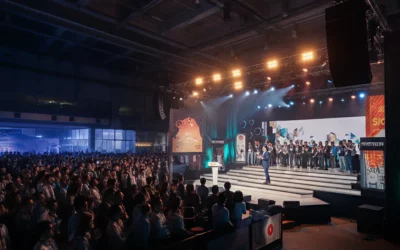The perfect event website does 2 things for you: 1) Maximizes the number of registrations, and 2) Provides thorough, up-to-date information to limit the number of questions and inquiries your event team will receive leading up to the event.
First, we’ll break down the 3 big phases of building and managing an event website that you should be aware of. Whether you are planning to build your website internally or you are considering a 3rd party, knowing these differences could save you an arm and a leg (and a lot of heartache)!
Next, we’ll describe the 5 key elements that your event website needs to attract a large audience while avoiding costly errors.
Keep in mind, we’ll use Event Website and Event Registration interchangeably in this article. Let’s go!
3 Important Considerations for Event Website Development
Unless you are a well-seasoned event team that has produced many event websites, you may not be considering everything that goes into the event website.
In fact, if you are considering a 3rd party event agency for your event website, you should read the fine print and look for specific language that defines their role as either simply building the website or building and managing the website. The difference can be night and day.
Sure, a quote for a website build @ $3,000 doesn’t sound that bad when you compare it to their competitor’s @ $5,000. The difference? Perhaps the competitor is offering to manage the website leading up to your event – Which could be a period of several months!
Let’s talk about the 3 key aspects to keep in mind whether you are tackling the website/registration internally or are outsourcing it.
1. Registration Build
This is the most obvious part of any event website, and unfortunately for many event planners new to websites, all that they consider. Don’t get me wrong, the registration build is extremely important and it requires the most technical know-how.
For corporate events, or really, any important events you might be using Cvent because it (currently) offers the most robust feature set which will definitely come in handy for registering sponsors, creative design, and offering extensive registration types.
2. On-going Management
The next part is taking care of the site that has been built.
What does this mean?
This means several things, such as:
- Adding sponsorship information to the website as you sign them up
- Managing attendee questions as they will inevitably come up
- Collecting registration information
- Updating the website pages with content as you get it, including: Agendas, breakout sessions offered, food option, time/date or location changes, and much more
- Dealing with up-time/downtime issues (server or application related, if applicable)
- Closing registration
- Sending communications leading up to the event, and then after
Now imagine if your event website is launched 9 months in advance of the event. OR perhaps your organization leaves the site up year-round to provide information and attract a larger audience. This could be a lot of management and much of it could be ‘seasonal’, with most of the work coming as you lead into the event.
3. Provide Up to Date Metrics
Staying on top of the number of attendee and sponsorship registrations is critical. Regardless of if it’s your own team managing the website, or a 3rd party such as J.Shay Event Solutions, you should be having regular meetings with the larger event team (and internal stakeholders) to update them of where you are in terms of hitting goals and objectives, how much revenue you are collecting, food preferences, etc – And the meetings should be more frequent the closer you get to the event.
Keeping your team up to date on all of this information prevents surprises and will ultimately maximize the ROI (and attendee satisfaction).
Event Website Must-Haves
Now that we’ve discussed the important considerations leading to your event website, let’s talk about what you actually need on the site to make it successful!
1. User-friendly Layout
This is the first point because if your Home or Landing page isn’t easy to use, prospects will bounce within the first few seconds. This skill is also hard to teach, so unless you are using a pre-designed template from Bizzabo or another provider, make sure you hire someone with experience!
2. Thorough Content
The event website should contain important information about the event, the speakers, food, location, time, breakout sessions and so much more. Not only does having a considerable amount of content help attract prospects, but it will also limit the number of questions you will receive!
3. Easy Registration
There is a delicate balance between asking too much and not asking enough. On one hand, you want to collect all the information you need to plan the most engaging and effective event possible (food, room block, entertainment, breakout sessions, etc.), but at the same time you don’t want attendees to get frustrated and bounce from the registration session.
Your event website absolutely needs an easy to follow registration path that doesn’t inundate the user with a surplus of questions – Carefully consider your options here.
4. Sponsorship Details
Looking for sponsors? Sponsorships can make or break an event.
Offering these packages has to be compelling, especially if you don’t have a long-standing event with a guarantee for success.
Make it extremely easy for sponsors to see the benefits of your event and what opportunities they have to be apart of your event.
5. Contact Options
We’ve made it clear that having a great event website will limit the number of inquiries you’ll get, which is a good thing. But there will inevitably be questions your website can not answer or opportunities for your event or organization that you want to invite such as partnerships, group registrations, public relations, etc.
If you need help with your next event website, we are certified and experienced with many of the major event website/registration platforms. Click here to start a quick conversation with us!
You might also like…
Top 10 U.S. Meeting Destinations for 2026
Successful corporate events don’t just happen — they’re built on smart decisions, starting with...
The Trade Show Prep Guide: Boost ROI Like a Pro
Trade shows are a powerful way to elevate your brand's visibility, connect with potential...
President’s Club 2026 Ultimate Gift Guide
Luxury, Personalization, and Impact for Unforgettable Incentive Travel President’s Club isn’t just...
The Role of Corporate Event Managers is Evolving
Corporate events aren’t what they used to be. Gone are the days of basic cocktail hours and...
Revitalizing Sales Kickoffs: Strategic Insights for 2026
Gone are the days when Sales Kickoffs (SKOs) were just annual corporate pep talks. Today's SKOs...
Planning for Performance: The 2026 Guide to Mastering Incentive Travel
Here's Why Incentive Travel is Your Secret Weapon in 2026... Gone are the days when incentive...







